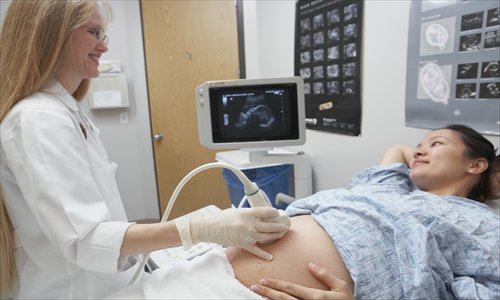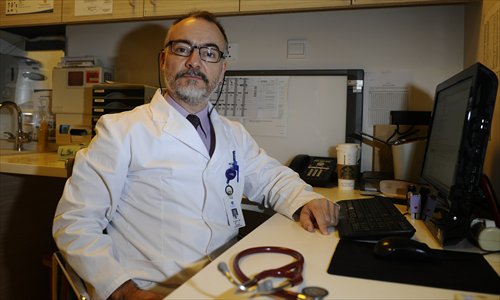The foreign doctor is in

Foreign GPs are helping reshape the Chinese healthcare system by working as family doctors in community health clinics. Photo: IC
In front of a community health clinic nestled in a hutong in Dongcheng district stands a signboard that reads in Chinese: "British doctor, feet checked for free." Inside the clinic is Dr Gilbert Shia, 56, who examines the feet of people at risk of diabetes for early warning signs of the disease.
Born in Hong Kong, Shia studied medicine and practiced in the UK for around 30 years before he relocated to Beijing in 2006.
As a general practitioner (GP), Shia was lured to China to be a part of the government's reforms to the healthcare system. "I think the British [general practice] concept is suitable for China. If I want to promote it, I need to come to the place where policies are made," Shia said of why he chose Beijing over other cities, including his parents' hometown of Shanghai.
Shia is among the latest in a long line of doctors bringing Western medical expertise to China. The earliest pioneers included doctors such as Peter Parker (1804-88), an American missionary who opened the first ophthalmic clinic in China; George Hatem (1910-88), a Lebanese-American who became the first foreign member of the Communist Party of China; and Norman Bethune (1890-1939), a Canadian who served as a medic to Chinese troops during World War II.
"I wouldn't dare be compared to these people. Bethune is like a hero. I have my life here," said Dr Jean-Pierre Dhenin, a French family physician at Chaoyang district hospital United Family Healthcare.
Compared to their famous predecessors lured to China by either religious or political motives, today's foreign doctors are attracted to the world's biggest healthcare system for its career prospects and to spearhead its change.

Photo: IC
Evolving healthcare model
Shia's main job is as clinical director of Medicgo, an international medical center in Chaoyang district. The private clinic is well-equipped and modern, with most patients being expats and white-collar workers employed in the area.
However, Shia's work at the hutong clinic brings him into contact with patients who are predominantly working class, unemployed or elderly. Shia is no stranger to working with people from the margins of society; in Oxford, his patients included people from low-income families and drug users.
In July 2011, the State Council announced plans to integrate GPs into the national healthcare system. The overall goal is to build a standardized system whereby there will be up to three GPs for every 10,000 people.
"When [the GP model] is introduced to China, people will think it's advanced and high-class. I hope to bring it to everybody," Shia said.
As someone of Chinese descent, Shia's appearance doesn't raise eyebrows at his clinic. It is only when he speaks Putonghua in his southern twang that patients become curious. He usually explains that he is from out of town or in Beijing for further education.
"Because when you tell them [you're a foreigner], they are either overly complimentary or just avoid you," he joked of his patients.
The first time Dhenin came to China was in 1989, when he took up an 18-month posting at the French Embassy. "It was like discovering a new world. Even though I had no connection and didn't know the language, I was interested in the country and the culture," he said.
"There were only three foreign doctors at that time in Beijing and no foreign clinics."
In 1990, Dhenin married his Chinese wife and both returned to France. The couple moved back to Beijing, his wife's hometown, in 1994.
When foreign-invested hospitals first opened in Beijing, expats formed the vast bulk of patients. Nowadays, more than one-third of Dhenin's patients are Chinese.
"I see more middle-class Chinese. They don't want to lose time or wait for the appointment. They want to be treated quickly and easily," said Dhenin, who is able to converse in Putonghua with Chinese patients.

Photo: IC
Improving doctor-patient trust
A typical day for Shia at his British clinic was seeing patients for roughly two hours in the morning, filling prescriptions over a tea break, and then seeing more patients in the afternoon. Working at clinics targeting expat patients in Beijing is not too different from this routine, he said.
Shia said it wasn't until he began treating local Chinese at a community clinic in Haidian district that "my eyes were really opened."
"The primary task for physicians at community clinics in China is prescribing drugs. Sometimes it feels like [doctors] are just running errands. They are busy, but without a clear goal," Shia explained.
China should use the UK's healthcare system as its model in rolling out reforms, said Shia. "Our habits are very expensive in China. Checkups are repeated and medicines are wasted. Seeing GPs [instead of specialists] can reduce strain on the healthcare system," he said.
Dhenin agreed, saying the GP model "can be a good fit in China" because patients will be treated by the right doctor.
About six months ago, Shia began working at a Haidian district community clinic. His work there allows him to conduct research on bringing standard monitoring methods of diabetes patients from Britain to China.
"People might believe the worst doctors are in the community clinics. China isn't facing a shortage of doctors at [the highest grade] 3A hospitals; it's facing a shortage of doctors who patients feel they can trust. Another thing that will be perfect for China's healthcare system is the standard operating procedure (SOP) used in the UK," said Shia, referring to a specific description of how to undertake a particular task.
Shia claims it is the fastest way to improve the expertise of community clinic doctors because SOPs for clinical practice are upgraded by specialist doctors.


Foreign doctors Jean-Pierre Dhenin and Gilbert Shia believe that China's healthcare system will have better productivity and doctor-patient relations if the GP model is adopted. Photos: Li Hao/GT
Adapting to Chinese patients
One facet of the Chinese healthcare system Shia would like to stamp out is "over treatment" of patients.
"Everybody gets a blood test and an intravenous drip, even the children," he said. "I want to educate parents to gradually change [the situation]. When kids have a fever, the parents panic. They need somebody to hold their hand and talk to them."
One thing that Shia didn't expect before he came to China was that many patients would offer to help him do his job by providing their own diagnosis and prescription recommendations.
"[Patients] order drugs as if they are ordering dishes. The prescription is already in their mind before I have a chance to examine them. It's as if they are the doctors and I'm just the prescription filler," he joked.
The problem of this phenomenon lies in patients' lack of trust in doctors, Shia said.
"On many occasions, they just ask their friends and families [about health issues] or make a judgment based on past experience. They don't have anybody they trust, so they solve health problems on their own," he said.
As for dealing with patients who have their mind made up on what medication they want, Dhenin said the best approach is to be firm. "You have to say, 'No, you don't need it.' Medication isn't something you can just order," he said.
Another interesting observation Shia has made is that although many Chinese patients are frugal about how much they spend within their medical insurance, they tend to spend big on specific medicines, folk remedies, health products and advertised appliances on their own.
Dhenin is intrigued by many patients who share their own traditional Chinese medicine-related theories when assessing their health. "When [Chinese] are sick, they still don't drink cold things. Maybe it's not scientific, but it's better and harmless in any case. I respect this kind of culture," he said.
As winter peaks and more people present flu-like symptoms, Dhenin said he has been inundated with patients. Despite having a busy work schedule, he enjoys his life in Beijing with his wife and two daughters, aged 20 and 17.
His palate has naturally adapted well to Chinese cuisine over the past decade, with the French doctor listing Chinese cabbage, tofu, pig intestines and ears, creamy sliced chicken and vermicelli with spicy minced pork among his favorite delicacies.
Dhenin admits he has developed a deep bond to Beijing, where he has overseen health scares including the outbreaks of SARS in 2003, H1N1 in 2006 and H7N9 earlier this year.
"They were stressful," he said of the incidents. "I think China has improved a lot over the past decade. What we want as doctors is to provide good care to patients."